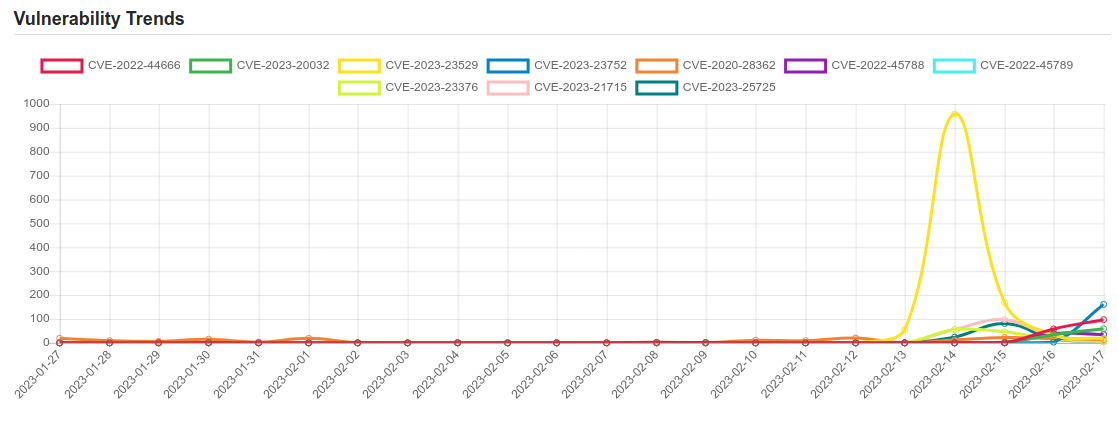Daily Vulnerability Trends: Sat Feb 18 2023

| CVE NAME | CVE Description |
| CVE-2023-23376 | Windows Common Log File System Driver Elevation of Privilege Vulnerability |
| CVE-2023-21715 | Microsoft Publisher Security Features Bypass Vulnerability |
| CVE-2023-25725 | HAProxy before 2.7.3 may allow a bypass of access control because HTTP/1 headers are inadvertently lost in some situations, aka “request smuggling.” The HTTP header parsers in HAProxy may accept empty header field names, which could be used to truncate the list of HTTP headers and thus make some headers disappear after being parsed and processed for HTTP/1.0 and HTTP/1.1. For HTTP/2 and HTTP/3, the impact is limited because the headers disappear before being parsed and processed, as if they had not been sent by the client. The fixed versions are 2.7.3, 2.6.9, 2.5.12, 2.4.22, 2.2.29, and 2.0.31. |
| CVE-2022-39952 | A external control of file name or path in Fortinet FortiNAC versions 9.4.0, 9.2.0 through 9.2.5, 9.1.0 through 9.1.7, 8.8.0 through 8.8.11, 8.7.0 through 8.7.6, 8.6.0 through 8.6.5, 8.5.0 through 8.5.4, 8.3.7 may allow an unauthenticated attacker to execute unauthorized code or commands via specifically crafted HTTP request. |
| CVE-2022-37955 | Windows Group Policy Elevation of Privilege Vulnerability. |
| CVE-2023-21823 | Windows Graphics Component Remote Code Execution Vulnerability |
| CVE-2021-42756 | Multiple stack-based buffer overflow vulnerabilities [CWE-121] in the proxy daemon of FortiWeb 5.x all versions, 6.0.7 and below, 6.1.2 and below, 6.2.6 and below, 6.3.16 and below, 6.4 all versions may allow an unauthenticated remote attacker to achieve arbitrary code execution via specifically crafted HTTP requests. |
| CVE-2023-21707 | Microsoft Exchange Server Remote Code Execution Vulnerability |
| CVE-2021-21974 | OpenSLP as used in ESXi (7.0 before ESXi70U1c-17325551, 6.7 before ESXi670-202102401-SG, 6.5 before ESXi650-202102101-SG) has a heap-overflow vulnerability. A malicious actor residing within the same network segment as ESXi who has access to port 427 may be able to trigger the heap-overflow issue in OpenSLP service resulting in remote code execution. |
| CVE-2022-47986 | IBM Aspera Faspex 4.4.1 could allow a remote attacker to execute arbitrary code on the system, caused by a YAML deserialization flaw. By sending a specially crafted obsolete API call, an attacker could exploit this vulnerability to execute arbitrary code on the system. The obsolete API call was removed in Faspex 4.4.2 PL2. IBM X-Force ID: 243512. |
| CVE-2023-21529 | Microsoft Exchange Server Remote Code Execution Vulnerability |
| CVE-2023-0669 | Fortra (formerly, HelpSystems) GoAnywhere MFT suffers from a pre-authentication command injection vulnerability in the License Response Servlet due to deserializing an arbitrary attacker-controlled object. This issue was patched in version 7.1.2. |
| CVE-2023-0662 | In PHP 8.0.X before 8.0.28, 8.1.X before 8.1.16 and 8.2.X before 8.2.3, excessive number of parts in HTTP form upload can cause high resource consumption and excessive number of log entries. This can cause denial of service on the affected server by exhausting CPU resources or disk space. |
| CVE-2022-44666 | Windows Contacts Remote Code Execution Vulnerability. |
| CVE-2023-20032 | No description provided |
A considerable amount of time and effort goes into maintaining this website, creating backend automation and creating new features and content for you to make actionable intelligence decisions. Everyone that supports the site helps enable new functionality.
If you like the site, please support us on Patreon using the button below

To keep up to date follow us on the below channels.





![Brute Ratel C4 Detected - 18[.]177[.]187[.]233:80 7 brute_ratel_c4](https://www.redpacketsecurity.com/wp-content/uploads/2022/07/brute_ratel_c4-300x300.jpg)
![Cobalt Strike Beacon Detected - 118[.]89[.]73[.]78:4433 8 Cobalt-Strike](https://www.redpacketsecurity.com/wp-content/uploads/2021/11/Cobalt-Strike-300x201.jpg)